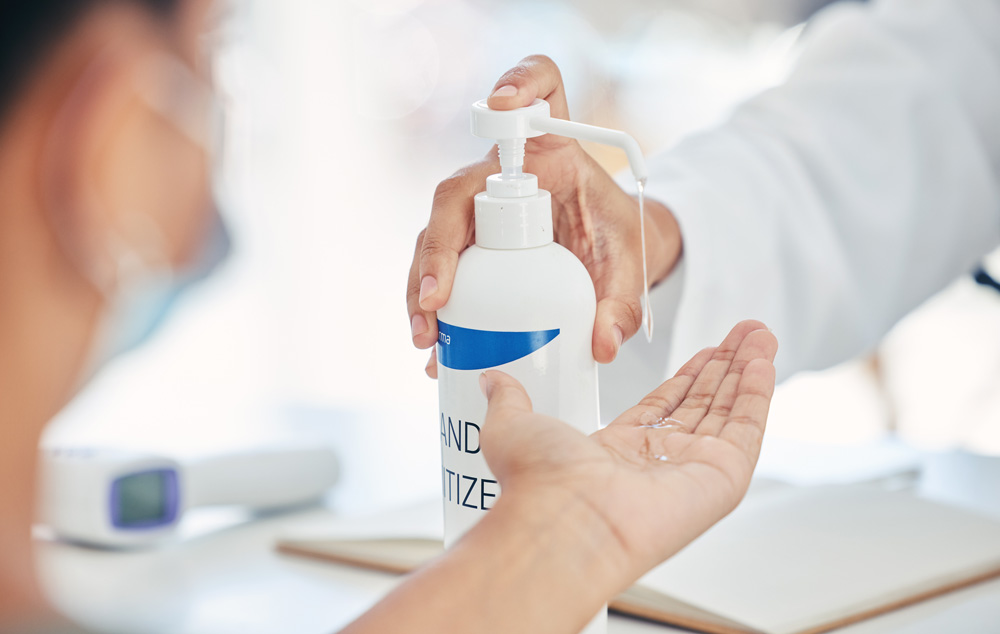Hand sanitizers have become an important tool in maintaining personal hygiene and minimizing the risk of infection, particularly with COVID-19.
But does it kill the virus?
Why should you use hand sanitizer?
Hand sanitizer is a crucial hygiene product recommended for its convenience and effectiveness in situations where soap and water aren’t readily available. When you use a hand sanitizer, it prevents the spread of harmful germs, especially in areas where serving others is a priority, such as:
- Healthcare facilities
- Food service establishments
- Public transportation
Its easy application and quick-drying nature make it a practical solution for maintaining hand hygiene on the go. By containing high levels of alcohol, typically around 60% or more, hand sanitizers have been proven to effectively reduce the number of microbes on hands, including bacteria and viruses.
If you’re in a service-oriented role, using a hand sanitizer isn’t only a personal health benefit but also a responsibility towards those you interact with. By incorporating hand sanitizer into your daily routine, you can help create safer environments for both you and the people you serve.
How does hand sanitizer work?
Alcohol is the primary active ingredient in hand sanitizers, and it works by breaking down the lipid layer that surrounds these viruses, which then deactivates them.
By targeting the lipid membranes of viruses, hand sanitizers help reduce the spread of infections, including COVID-19, as long as it has at least 60% alcohol concentration for optimal effectiveness.
Hand sanitizer vs. washing your hands
While hand sanitizers are convenient for on-the-go use and can effectively reduce the number of microbes on hands, washing hands with soap and water remains the gold standard for removing dirt, grease and germs.
Handwashing with soap and water for at least 20 seconds is recommended by health authorities as the most effective way to prevent the spread of infections, including COVID-19.
Hand sanitizers are a suitable alternative when soap and water are unavailable, but they may be less effective on visibly dirty or greasy hands. Also, they don’t eliminate all types of germs, such as noroviruses and Clostridium difficile spores.
When should hand sanitizer be used?
A hand sanitizer should be used when there’s no soap and water, especially in situations where you may have come into contact with potentially harmful germs or viruses.
It’s advisable to use hand sanitizer during these situations:
- Before and after preparing food
- Before eating
- After using public transportation
- After touching surfaces in high-traffic areas like doorknobs or handrails
Healthcare workers, caregivers and people in crowded environments can benefit from regular hand sanitizer use to reduce the spread of infections.
When caring for sick people or when feeling unwell yourself, using hand sanitizer frequently can help prevent the transmission of germs.
Can hand sanitizers protect you from viruses?
When combating viral infections hand sanitizers can help reduce the risk of viral transmission if used correctly.
Bottom line: Keep washing your hands
While hand sanitizers can serve as a convenient alternative in situations where soap and water are unavailable, they’re not as effective as thorough handwashing in removing microbes from the skin.
Especially during health emergencies like the COVID-19 pandemic, it’s crucial to adhere to expert recommendations for effective actions. That said, despite the widespread use and popularity of hand sanitizers, the bottom line remains unchanged: washing hands with soap and water is the most effective hygiene practice for reducing the spread of infections.
Frequently asked questions
Can hand sanitizer be harmful if ingested?
Ingesting hand sanitizer can be harmful due to its high alcohol content. Symptoms of ingestion may include nausea, vomiting, dizziness and in severe cases, organ damage or death. Keep hand sanitizers out of reach of children.
Are there any long-term effects of using hand sanitizer frequently?
Frequent use of hand sanitizer may lead to skin dryness and irritation due to alcohol content. Prolonged exposure to alcohol-based sanitizers might disrupt the skin’s natural barrier. Consider using moisturizers and practicing proper hand care routines.
Can a hand sanitizer expire or lose its effectiveness over time?
Hand sanitizer can expire or lose effectiveness over time due to evaporation of alcohol content or degradation of other ingredients. Check expiration dates and storage conditions. If properly stored, sanitizers with 60% alcohol remain effective against germs.
Is it safe to use hand sanitizer on children or infants?
When considering the safety of using hand sanitizer on children or infants, you may consult your healthcare provider. Children’s skin can be more sensitive, and certain ingredients in hand sanitizers may not be suitable for their delicate skin.
Are there any environmental impacts of using hand sanitizer regularly?
Regular use of hand sanitizer can lead to environmental impacts due to chemical disposal. Ethanol and isopropyl alcohol, common ingredients, can contaminate water sources. Proper disposal and limited use are recommended to minimize ecological harm.
Key takeaway
Hand sanitizers help in keeping personal hygiene and infection control, particularly during the COVID-19 pandemic.
While it can effectively kill certain viruses and bacteria, it’s not a foolproof method for preventing the spread of the novel coronavirus.
Hand sanitizer should be used in conjunction with frequent hand washing to maintain proper hygiene practices and reduce the risk of infection.




















































